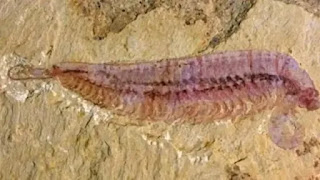TOKYO : FIVE-EYED fossil shrimp seen as evolutionary ''missing link''.
The discovery of a five-eyed shrimp-like creature that lived about 520 million years ago may end a long-running debate about the evolution of Earth's most common animals.
Arthropods, ranging from lobsters and crabs to spiders and millipedes, make up around 80 percent of all animal species alive today and are characterized by their hard exoskeleton.
But their evolution has long remained something of a mystery, because their ancient ancestors carry a variety of features that their modern counterparts do not.
Enter Kylinxia zhangi, a shrimp-life creature preserved in fossils found in China's Yunnan province - a discovery that researchers now say could be key ''missing link'' in arthropod evolution Like today's arthropods, Kylinxia had a hard shell, a segmented body and legs with joints.
But the ancient creature also had characteristics in common with even older animals, leading researchers to name it after the ''Kylin'', a creature in traditional Chinese mythology with attributes from a variety of animals.
First there are those eyes - three smaller ones in a row on its head, with two large ones directly behind.
It might sound bizarre, but it's feature that scientists have seen before, in an ancient creature called Opabinia, known informally as a ''weird wonder''.
And the Kylinxia's two spiky front appendages, researchers say, are reminiscent of another creature thought to be an arthropod ancestor : the Anomalocaris.
While both have been theorised as precursors to modern arthropods, an evolutionary gap in the fossil records made that difficult to prove - until this week.
''Kylinxia represents a crucial transitional fossil predicted by Darwin's evolutionary theory,'' said Han Zeng, first author a study published in the journal Nature on Wednesday.
''It bridges the evolutionary gap from Anomalocaris to true arthropods and forms a key ''missing link'' in the origin of arthropods,'' added Zeng, a researcher at the Nanjing Institute of Geology and Paleontology [NIGPAS], in a press release. [AFP]

.png)


0 comments:
Post a Comment
Grace A Comment!